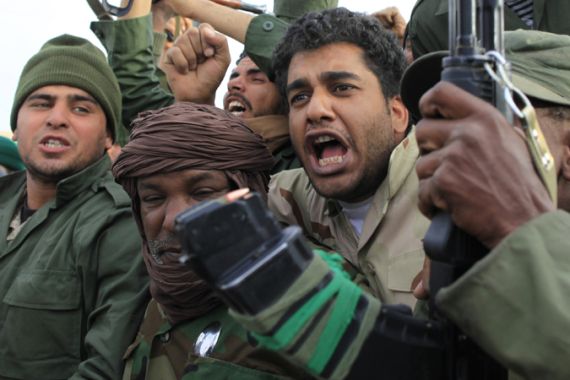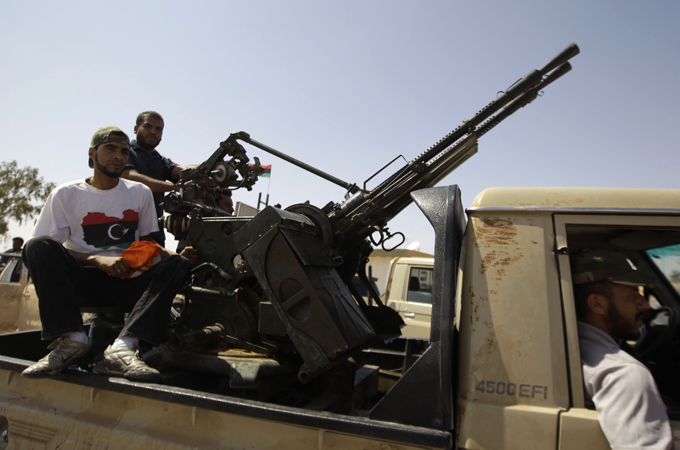Gaddafi forces retake key western village
Forces loyal to Libyan leader capture Qwalish, a strategically important village captured by rebels a week ago.

 |
| Gaddafi loyalists retook a village seized by rebels a week ago, hindering rebel plans for a march on Tripoli [Reuters] |
Muammar Gaddafi’s forces have launched a counter-attack against rebels southwest of Tripoli, as a commander downplayed talk of a political solution to the conflict, insisting the Libyan leader would refuse to step down.
Wednesday’s offensive comes just two days after rebels spoke of launching a major advance themselves, eyeing the Gaddafi-held towns of Asabah and Gharyan at the eastern end of the Nafusa Mountains and a gateway to the capital.
Gaddafi’s forces overran rebel advance positions around the desert hamlet of Qwalish, a key point on the road to Tripoli, and pushed on towards the hill village of Kikla, an AFP correspondent said.
Al Jazeera’s James Bays, reporting from the Nafusa Mountains, said this has been the most testing day militarily for the rebels who only wrested the town from Gaddafi’s troops seven days ago.
The AFP correspondent said he had seen very few rebels on the road towards Kikla as the retreating fighters scrambled to regroup.
Deal ‘impossible’
As the fighting rages, rebels in the mountains said on Wednesday that a peace deal was “impossible,” as Gaddafi refuses to step down.
|
|
“Up to now it is impossible to get a political solution. Gaddafi wants to stay; the rebels don’t want [that],” said Colonel Juma Brahim, head of the rebels’ operational command for the region.
On Tuesday, French and Libyan officials had talked up the chances of negotiating Gaddafi‘s withdrawal from power and an end to the conflict still wracking the country after months of military stalemate.
Brahim said it was “difficult to understand” the position of France, which has been one of the main players in the NATO-led coalition which has been conducting an air war against Gaddafi’s forces.
French aircraft carried out controversial arms drops to fighters under the rebel colonel’s command in recent weeks.
“On one side she helps you, on the other side [she is] talking to the regime of Gaddafi. Politically it is possible but militarily it is not possible,” he said.
“It is good when everything is on one side – with him or with us.”
Military base
Even before the latest counter-attack, the rebels, who are reported to have allies inside the town fomenting revolution and spies providing intelligence on enemy positions, faced a tough task in trying to take the town of Asabah.
While the rebels have been buoyed by a clutch of victories in the mountains, Asabah is home to prominent families close to the regime.
It has a large military base and a population largely faithful to the regime. The Libyan leader felt comfortable enough to have a country house there.
Since the rebels took the hamlet of Gualish on Wednesday, 17km from Asabah, they have been awaiting the green light from NATO to advance.
“We don’t know when, but there will be a battle, and soon,” said Brahim.
Abuse claims
In other developments on Wednesday, Belgium, Luxembourg and the Netherlands became the latest countries to recognise the opposition National Transitional Council (NTC) as the Libyan people’s legitimate representative, Belgian foreign minister Steven Vanackere said.
The announcement came ahead of a meeting Vanackere and his Dutch and Luxembourg counterparts were to hold with a rebel delegation.
The delegation, led by NTC leader Mahmoud Jibril, held talks earlier on Wednesday with NATO secretary general Anders Fogh Rasmussen and the alliance’s ambassadors at NATO headquarters in Brussels.
Following that meeting, Jibril rejected accusations by Human Rights Watch (HRW) that anti-Gaddafi forces had been responsible for looting, arson and abusing civilians.
 |
He admitted a “few incidents” of abuse took place in the first two weeks of the conflict, which began in mid-February, but “this is no longer the case in the liberated areas”.
HRW said it “witnessed some of these acts, interviewed witnesses to others and spoke with a rebel commander about the abuses”.
The abuses were said to have taken place in June and July, as recently as last week, as rebel forces pushed through the Nafusa Mountains.
“The rebel authorities have a duty to protect civilians and their property, especially hospitals, and discipline anyone responsible for looting or other abuse,” said HRW’s Joe Stork.